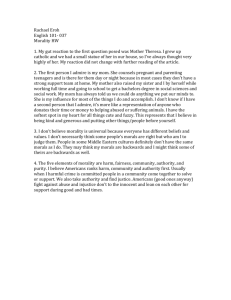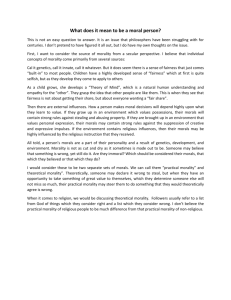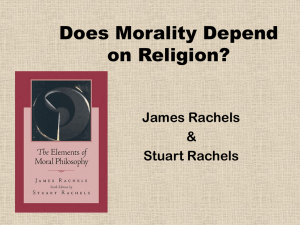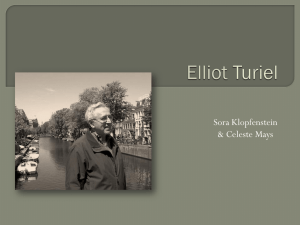Devlin: Democracy and Morality
advertisement
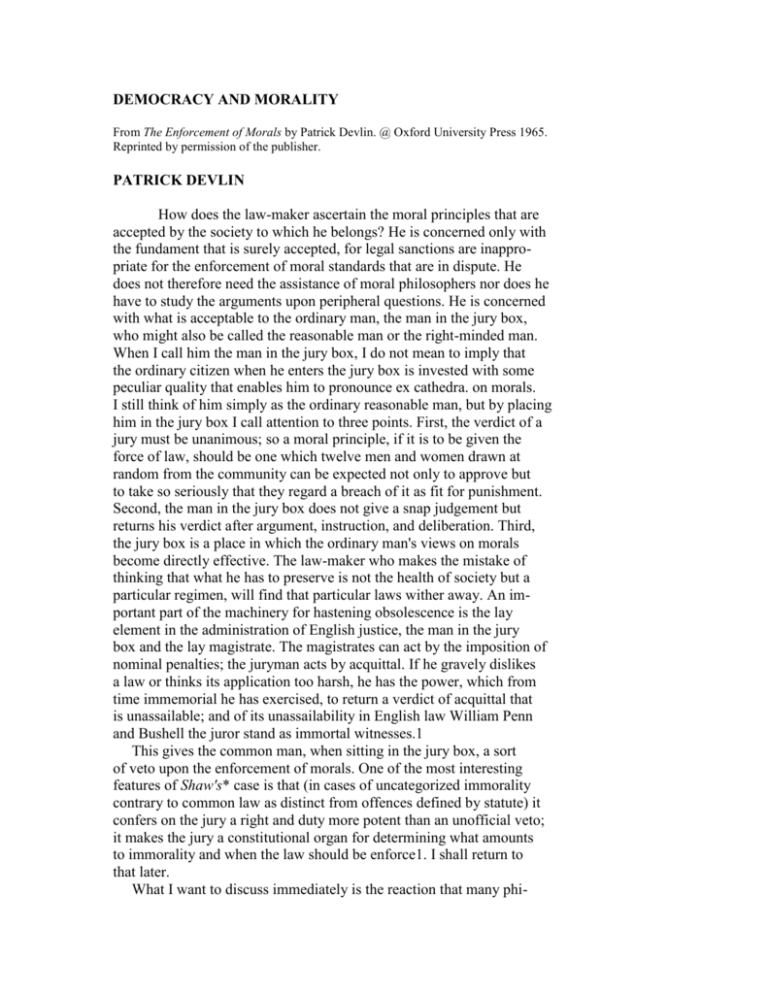
DEMOCRACY AND MORALITY From The Enforcement of Morals by Patrick Devlin. @ Oxford University Press 1965. Reprinted by permission of the publisher. PATRICK DEVLIN How does the law-maker ascertain the moral principles that are accepted by the society to which he belongs? He is concerned only with the fundament that is surely accepted, for legal sanctions are inappropriate for the enforcement of moral standards that are in dispute. He does not therefore need the assistance of moral philosophers nor does he have to study the arguments upon peripheral questions. He is concerned with what is acceptable to the ordinary man, the man in the jury box, who might also be called the reasonable man or the right-minded man. When I call him the man in the jury box, I do not mean to imply that the ordinary citizen when he enters the jury box is invested with some peculiar quality that enables him to pronounce ex cathedra. on morals. I still think of him simply as the ordinary reasonable man, but by placing him in the jury box I call attention to three points. First, the verdict of a jury must be unanimous; so a moral principle, if it is to be given the force of law, should be one which twelve men and women drawn at random from the community can be expected not only to approve but to take so seriously that they regard a breach of it as fit for punishment. Second, the man in the jury box does not give a snap judgement but returns his verdict after argument, instruction, and deliberation. Third, the jury box is a place in which the ordinary man's views on morals become directly effective. The law-maker who makes the mistake of thinking that what he has to preserve is not the health of society but a particular regimen, will find that particular laws wither away. An important part of the machinery for hastening obsolescence is the lay element in the administration of English justice, the man in the jury box and the lay magistrate. The magistrates can act by the imposition of nominal penalties; the juryman acts by acquittal. If he gravely dislikes a law or thinks its application too harsh, he has the power, which from time immemorial he has exercised, to return a verdict of acquittal that is unassailable; and of its unassailability in English law William Penn and Bushell the juror stand as immortal witnesses.1 This gives the common man, when sitting in the jury box, a sort of veto upon the enforcement of morals. One of the most interesting features of Shaw's* case is that (in cases of uncategorized immorality contrary to common law as distinct from offences defined by statute) it confers on the jury a right and duty more potent than an unofficial veto; it makes the jury a constitutional organ for determining what amounts to immorality and when the law should be enforce1. I shall return to that later. What I want to discuss immediately is the reaction that many phi- losophers and academic lawyers have to the doctrine I have just outlined. They dislike it very much. It reduces morality, they feel, to the level of a question of fact. What Professor H. L. A. Hart calls rationalist morality,2 which I take to be morality embodied in the rational judgement of men who have studied moral questions and pondered long on what the answers ought to be, will be blown aside by a gust of popular morality compounded of all the irrational prejudices and emotions of the man in the street. Societies in the past have tolerated witch-hunting and burnt heretics: was that done in the name of morality? There are societies today whose moral standards permit them to discriminate against men because of their colour: have we to accept that? Is reason to play no part in the separation of right from wrong? The most significant thing about questions of this type is that none of the questioners would think them worth asking if the point at issue had nothing in it of the spiritual. It is a commonplace that in our sort of society matters of great moment are settled in accordance with the opinion of the ordinary citizen who acts no more arid no less rationally in matters of policy than in matters of morals. Such is the consequence of democracy and universal suffrage. Those who have had the benefit of a higher education and feel themselves better equipped to solve the nation's problems than the average may find it distasteful to submit to herd opinion. History tells them that democracies are far from perfect and have in the past done many foolish and even wicked things. But they do not dispute that in the end the will of the people must prevail nor do they seek to appeal from it to the throne of reason. But when it comes to a pure point of morals-for example, is homosexuality immoral and sinful?-the first reaction of most of us is different. 1 See Bushell's Case (1670), Jones 1, at 13, 84 Eng, Rep. 1123. * .Shaw v. Director of Public Prosecutions. The case is discussed in The Enforcement of Morals at 87-88 and at 97-100. Ed. 2 Hart, "Immorality and Treason," The Listener, 1959, vol. 62, pp. 162, 163. Professor Hart's views on this point have been considered by Dean Rostow in "The Enforcement of Morals;' Cambridge Law Journal, 1960, pp. 174, 184-92. I cannot improve on what the Dean has said; I merely elaborate it in my own words. That reaction illustrates vividly the vacuum that is created when a society no longer acknowledges a supreme spiritual authority. For most of the history of mankind this sort of question has been settled, for men in society as well as for men as individuals, by priests claiming to speak with the voice of God. Today a man's own conscience is for him the final arbiter: but what for society? This problem does not arise for one who takes the extreme view that society and the law have no concern at all with morals and that a man may behave as he wishes so long as he respects another's physical person and property. But I believe that there is general agreement that that is not enough and that the law should prevent a man from, for example, corrupting the morals of youth or offending the moral standards of others by a public display of what they regard as vice. The law cannot interfere in these ways except from the basis of a common or public morality. Whatever view one takes of the law's right of interventionwhether it should be no wider than is necessary' to protect youth or as wide as may be desirable to conserve the moral health of the whole community-one still has to answer the question: "How are moral standards to be ascertained in the absence of a spiritual authority?" This question, it seems to me, has received less study than it ought to have. The lawyers have evaded it by means of the assumption, substantially justifiable in fact though not in theory, that Christian morality remains just as valid for the purposes of the law as it was in the days of a universal church. The philosophers seem to have assumed that because a man's conscience could do for him, if he so chose, all that in the age of faith the priest had done, it could likewise do for society all that the priest had done. It cannot, unless some way be found of making up a collective conscience. It is said or implied that this can be done by accepting the sovereignty of reason which will direct the conscience of every man to the same conclusion. The humbler way of using the power of reason is' to hold, as Aquinas did, that through it is possible to ascertain the law as God ordered it, the natural law, the law as it ought to be; the prouder is to assert that the reason of man unaided can construct the law as It ought to be. If the latter view is right, then one must ask: As men of reason are all men equal? If they are, if every man has equivalent power of reasoning and strength of mind to subdue the baser faculties of feeling and emotion, there can be no objection to morality being a matter for the popular vote. The objection is sustainable only upon the view that the opinion of the trained and educated mind, reached as its owner believes by an unimpassioned rational process, is as a source of morals superior to the opinion of ordinary men.3 To the whole of this thesis, however it be put and whether or not 3 In a letter published in The Times (London), 22 March 1961, p. 13, col. 5, a distinguished historian wrote that what clinched the issue in the relationship between morality and the law was "simply that it is impossible to administer justice on a law as to which there is a fundamental disagreement among educated opinion." (My italics.) it is valid for the individual mind that is governed by philosophy or faith, the law-maker in a democratic society must advance insuperable objections, both practical and theoretical. The practical objection is that after centuries of debate, men of undoubted reasoning power and honesty of purpose have shown themselves unable to agree on what the moral law should be, differing sometimes upon the answer to the simplest moral problem. To say this is not to deny the value of discussion among moral philosophers or to overlook the possibility that sometime between now and the end of the world universal agreement may be reached, but it is to say that as a guide to the degree of definition re- quired by the law-maker the method is valueless. Theoretically the method is inadmissible. If what reason has to discover is the law of God, it is inadmissible because it assumes, as of course Aquinas did, belief in God as a law-giver, If it is the law of man and if a common opinion on any point is held by the educated elite, what is obtained except to substitute for the voice of God the voice of the Superior Person? A free society is as much offended by the dictates of an intellectual oligarchy as by those of an autocrat. For myself I have found no satisfactory alternative to the thesis I have proposed. The opposition to it, I cannot help thinking, has not rid itself of the idea, natural to a philosopher, that a man who is seeking a moral law ought also to be in pursuit of absolute truth. If he were, they would think it surprising' if he found truth at the bottom of the popular vote. I do not think it as far from this as some learned people suppose and I have known them to search for it in what seem to me to be odder places. But that is a subject outside the scope of this lecture which is not concerned with absolute truth. I have said that a sense of right and wrong is necessary for the life of a community. It is not necessary that their appreciation of right and wrong, tested in the light of one set or another of those abstract propositions about which men forever dispute, should be correct. If it were, only one society at most could survive. What the law-maker has to ascertain is not the true belief but the common belief. When I talk of the law-maker I mean a man whose business it is to make the law whether it takes the form of a legislative enactment or of a judicial decision, as contrasted with the lawyer whose business is to interpret and apply the law as it is, Of course the two function soften overlap; judges especially are thought of as performing both. No one now is shocked by the idea that the lawyer is concerned simply with the law as it is and not as he thinks it ought to be. No one need be shocked by the idea that the law-maker is concerned .with morality as it is. There are, have been, and will be bad laws, bad morals, and bad societies. Probably no law-maker believes that the morality he is enacting is false, but that does not make it true. Unfortunately bad societies can live on bad morals just as well as good societies on good ones. In a democracy educated men cannot be put into a separate category for the decision of moral questions. But that does not mean that in a free society they cannot enjoy and exploit the advantage of the superior mind. The law-maker's task, even in a democracy, is not the drab one of counting heads or of synthesizing answers to moral questions given in a Gallup poll. In theory a sharp line can be drawn between law and morality as they are-positive law and positive morality-and as they ought to be; but in practice no such line can be drawn, because positive morality, like every other basis for the law, is subject to change, and consequently the law has to be developed. A judge is tethered to the positive law but not shackled to it. So long as he does not break away from the positive law, that is, from the precedents which are set for him or the clear language of the statute which he is applying, he can determine for himself the distance and direction of his advance. Naturally he will move towards the law as he thinks it ought to be. If he has moved in the right direction, along the way his society would wish to go, there will come a time when the tethering-point is uprooted and moved nearer to the position he has taken; if he has moved in the wrong direction, he or his successors will be pulled back. The legislator as an enforcer of morals has far greater latitude than the modern judge. Legislation of that sort is not usually made an election issue but is left to the initiative of those who are returned to power. In deciding whether or not to take the initiative the relevant question nearly always is not what popular morality, is but whether it should be enforced by the criminal law. If there is a reasonable doubt on the first point, that doubt of itself answers the whole question in the negative. The legislator must gauge the intensity with which a popular moral conviction is held, because it is only when the obverse is generally thought to be intolerable that the criminal law can safely and properly be used. But if he decides that point in favour of the proposed legislation, there are many other factors, some of principle and some of expediency, to be weighed, and these give the legislator a wide discretion in determining how far he will go in the direction of the law as he thinks it ought to be. The restraint upon him is that if he moves too far from the common sense of his society, he will forfeit the popular goodwill and risk seeing his work undone by his successor. This is the method of Jaw-making common to both America and England. The popular vote does not itself enact or veto; rather, the initiative is put into the hands of a very few men. Under this method the law reformer has a double opportunity. He may work upon the popular opinion which is the law-makers' base or he may influence the law-maker directly. At each of these stages the educated man is at an advantage in a democratic society. Let us consider the first stage. True it is that in the final count the word of the educated man goes for no more than that of any other sort of man. But in the making up of the tally he has or should have the advantage of powers of persuasion above the ordinary. I do not mean by that simply powers of reasoning. If he is to be effective he must be ready to persuade and not just to teach, and he must accept that reason is not the plain man's only guide. "The common morality of a society at any time," says Dean Rostow, "is a blend of custom and conviction, of reason and feeling, of experience and prejudice." 4 If an educated man is armed only with reason, if he is disdainful of custom and ignores strength of feeling, if he thinks of "prejudice" and "intolerance" as words with no connotations that are not disgraceful and is blind to religious conviction, he had better not venture outside his academy, for if he does he will have to deal with forces he cannot understand. Not all learned men are prepared like Bertrand Russell to sit on the pavement outside No. 10 Downing Street. Not all are lucid as well as erudite. Many a man will find satisfaction in teaching others to do what he is not equipped to do himself; but it is naive for such a man to reproach judges and legislators for making what he deems to be irrational law, as if In a democratic society they were the agents only of reason and the controllers of a nation' s thought. The other advantage which the educated man possesses is that he has easier access to the ear of the law-maker. I do not mean merely by lobbying. When-with such latitude as our democratic and judicial system allows-the law-maker is determining the pace and direction of his advance from the law that is towards the law that ought to be, he does and should inform himself of the views of wise and experienced men and pay extra attention to them. These are the ways by which well-informed and articulate men can playa part in the shaping of the law quite disproportionate to their numbers. Under a system in which no single question is submitted to the electorate for direct decision, an ardent minority for or against a particular measure may often count for more than an apathetic majority. Recently in England in the reform of the criminal law a minority has had some remarkable successes. In 1948 flogging was abolished as a judicial punishment; 5 it is doubtful whether that would have been the result of a majority vote, and it is still uncertain whether the gain will, be 'held. Some years later much the same body of opinion was very nearly successful in abolishing' capital punishment; I do not believe that in the country as a whole there is a majority against capital punishment. In 1959 the cqmmon law on obscenity was altered by statute. 6 Notwithstanding that the tendency of a book is to deprave and corrupt, it is a good defence if its publication is in the interests of some "object of general concern," such as literature or art; and the opinion of experts is made admissible on the merits of the work. Under this latter provision in the recent case of Lady Chatterley's Lover, 7 thirty-five witnesses distinguished in the fields of literature and morals were permitted to discuss at large the 4 Rostow, op. cit. p. 197. 5 Criminal Justice Act, 1948, 11 & 12 Geo.. 6, c. 58, s. 2. 6 Obscene Publications Act, 1959, 7 & 8 E1iz. 2, c. 66, s. 4. 7 The transcript of the trial, somewhat abridged, has been published as The Trial of Lady Chatterley: Regina v. Penguin Books Limited (Rolph edn. 1961). merits of the book, and thus a specially qualified body of opinion was brought into direct communication with the jury. On the other hand there has so far been a failure to reform the law against homosexuality. The conclusion of the Wolfenden Committee is an indication-I believe a correct one-that a substantial majority of "educated opinion" is in favour of some modification; but I believe also that the Home Secretary was right in his conclusion that public opinion as a whole was too strongly against the proposed amendments to permit legislation.
